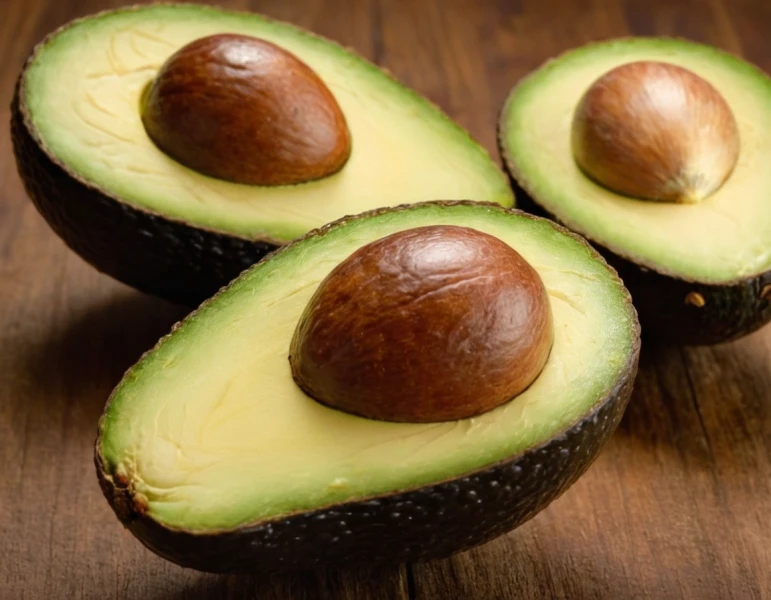Educa UNIVERSITY|HEALTH
Avocado: A Nutritional Treasure You Can't Ignore
Related Masters
Avocado: A Nutritional Treasure You Can't Ignore
Hello! I'm Rubén Águila, and today I'm here to talk to you about a fruit that, although small, is a bomb of nutrients: the avocado. Throughout my life, I have had the opportunity to explore and analyze in depth the nutritional value of this green wonder. So, get comfortable, because let's dive into the fascinating world of the avocado.
What Makes Avocado So Special?
Avocado is a one-of-a-kind fruit. Unlike other fruits, its healthy fat content is remarkably high, giving it a creamy texture and unparalleled flavor. But what really sets it apart in nutritional terms?

Avocado Nutritional Profile
To better understand its benefits, we will break down its content per 100 grams:
- Calories: 160 kcal
- Total fat: 15 g
- Saturated fat: 2.1 g
- Monounsaturated fat: 9.8 g
- Polyunsaturated fats: 2 g
- Cholesterol: 0 mg
- Sodium: 7 mg
- Potassium: 485 mg
- Total carbohydrates: 8.5 g
- Dietary fiber: 7 g
- Sugars: 0.7 g
- Vitamin C: 10 mg (17% of RDA)
- Vitamin E: 2.1 mg (10% of RDA)
- Vitamin K: 21 µg (26% of the RDA)
- Folic acid: 81 µg (20% of the RDA)
- Magnesium: 29 mg (7% of RDA)
- Phosphorus: 52 mg (5% of RDA)
- Iron: 0.6 mg (3% of RDA)
Healthy Fats: The Heart of Avocado
One of the main reasons why avocado is so highly valued is because of its monounsaturated fat content, especially oleic acid. This type of fat is known for its cardiovascular health benefits, as it helps reduce LDL ("bad") cholesterol levels and increase HDL ("good") cholesterol. In addition, these fats are essential for the absorption of fat-soluble vitamins such as A, D, E and K.
Vitamins and Minerals: A Cluster of Benefits
Avocado is a rich source of several essential vitamins and minerals:
- Vitamin E: A potent antioxidant that protects our cells from oxidative damage.
- Vitamin C: Important for the immune system and collagen synthesis.
- Vitamin K: Essential for blood clotting and bone health.
- Folic acid (Vitamin B9): Crucial during pregnancy for fetal development and blood cell production.
- Potassium: Helps maintain fluid and electrolyte balance, and is vital for muscle and nerve function.
- Magnesium: Involved in numerous biochemical reactions in the body, including muscle and nerve function, and blood glucose regulation.
Dietary Fiber: Digestion Ally
With 7 grams of fiber per 100 grams, avocado contributes significantly to the recommended daily intake of fiber. Fiber is essential for healthy digestion, helps maintain stable blood sugar levels and promotes feelings of satiety, which can be beneficial for weight management.
Avocado Myths and Facts
Throughout my career, I've heard countless myths about avocados. Let's debunk a few:
"Avocado is fattening because of its high fat content." False. Although it is caloric, the fats it contains are healthy and, consumed in moderation, can be part of a balanced diet without contributing to weight gain.
"You should not eat avocado every day." False. Incorporating half an avocado daily can provide benefits without risk, as long as a balanced diet is maintained.
"Avocados are bad for the heart because of their fat content." False. The monounsaturated fats in avocado are beneficial for cardiovascular health.
Incorporating Avocado into your Diet
Now that we know its benefits, how can we include avocado in our daily diet?
- On toast: A slice of whole wheat bread with smashed avocado, a squeeze of lemon and a pinch of salt is the perfect breakfast. If you add a poached egg or tomato, you'll be taking the flavor to another level.
- In salads: Avocado goes perfectly with greens, nuts, and a light vinaigrette. It adds creaminess and a touch of freshness that elevates any salad.
- In smoothies: Believe it or not, avocado is excellent in smoothies. Blended with banana, spinach, almond milk and a touch of honey, you'll get a creamy, nutritious and delicious smoothie.
- In guacamole: The classic of classics! Mash an avocado with onion, cilantro, lime, tomato and salt. It's perfect with nachos, tacos or even as a topping for meats and fish.
- As a butter substitute: Avocado can be a healthy alternative spread instead of butter or margarine. Ideal for those looking to reduce saturated fats in their diet.
Avocado in Popular Culture
Over the years, avocado has gone from being a staple ingredient in certain regions to an icon of healthy eating globally. In my case, I remember when I was a kid at home eating it by the spoonful with a little salt, not knowing that we were enjoying a superfood. Today, avocado stars in everything from memes to gourmet recipes. It is proof that the traditional can be transformed into a trend.
Conclusion: Why Avocado is a Must-Have?
Avocado is much more than a fruit: it is an ally for health, cooking and a healthy lifestyle. With its unique combination of healthy fats, fiber, vitamins and minerals, it's a food that deserves a prominent place in any balanced diet. Whether you use it in your breakfasts, meals or snacks, avocado is a nutritious and delicious option that never disappoints.
As a good saying I learned goes, "If you've got avocado, you've got happiness." So, enjoy it! And remember, eating well doesn't have to be boring, especially when you have a superfood like avocado on your plate.
Faculties
Trainings
The faculties embrace diverse academic disciplines and fields of study, opening doors to new perspectives and exploring different spheres of wisdom in a constantly evolving world.














